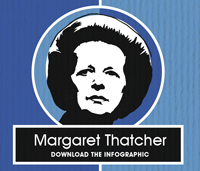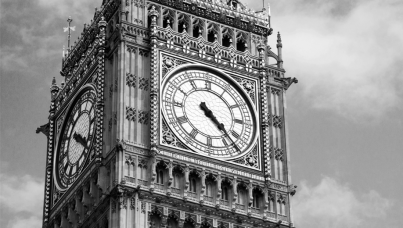Margaret Thatcher (1925-2013)
Margaret Thatcher was British Prime Minister from May 1979 to November 1990, and in almost every month during that period MORI polled the opinions of the British public about her performance as Prime Minister, the way the government was running the country, how they would vote if there were an election and what they thought about the issues of the day.
Looking back:
In a poll for Reuters in 2011, more of the British public remembered Mrs Thatcher as the most capable Prime Minister of the last few decades than preferred any of her successors: a third (36%) said they considered her to be the most capable leader, while 27% picked Tony Blair, 11% Gordon Brown, 10% David Cameron and 7% John Major.
At the time of her resignation in November 1990, 52% of the public said that they thought her government had been good for the country and 40% that it had been bad.
At the time of her resignation, even though the balance of opinion was that her government had been good for the country, three in five of the public (60%) said they disliked her and only 39% that they liked her.
Compared in 2011 with other recent PMs, 22% said that Lady Thatcher was the one they liked most as a person while 26% preferred Tony Blair. David Cameron was most liked by 17%, Gordon Brown by 13% and John Major by 10%.
In a 2001 poll more people said they found her inspirational than Tony Blair or the Pope, behind only Nelson Mandela and Richard Branson.
During her time in office:
On average during Mrs Thatcher’s premiership, 40% of the public were satisfied with the way she was doing her job while 54% were dissatisfied. But at the peak of her popularity (in June 1982, after the recapture of the Falklands), 59% were satisfied with her performance, while her rating fell as low as 20% satisfied (in March 1990, the month in which there were riots in London against the introduction of the “poll tax”).
Average satisfaction with the way her government was running the country was 32%, compared to an average 59% who were dissatisfied. The low points were 16% satisfied in March 1981 and again in March 1990. The high point was a rating of 51% satisfied in June 1982. (Only Tony Blair’s government, for a few months when he first took office and later briefly after the 9/11 attacks, ever had higher satisfaction ratings in our polls).
The Conservatives won three general elections under Margaret Thatcher’s leadership, with 45%, 44% and 43% of the GB vote. Between elections, however, there were considerable periods of unpopularity, including Conservative support falling to a consistent level of 27% throughout the Autumn of 1981 as the SDP was launched and formed an Alliance with the Liberals. But six months later, as the Falklands were regained and economic optimism began to rise, the party’s support almost doubled, to 51%.
Throughout her time in Downing Street, Mrs Thatcher evoked strong feelings both in support and opposition. In 1983 our leader image poll found that 62% picked “capable leader” and 62% “good in a crisis” as descriptions fitting her, both higher than any other leader has ever scored in our polls. But at the same time 54% felt that she “tends to talk down to people”, and while 47% felt she “understands the problems facing Britain” 49% saw her as “out of touch with ordinary people”. By her final year in office, the number seeing her as “out of touch” had climbed to 63%.
Achievements in office:
Mrs Thatcher’s government was most popular in the aftermath of the Falklands War. By the time the Argentinian forces finally surrendered, 84% of the British people said they were satisfied with the way the government had handled the situation. Almost half, 45%, said their opinion of Mrs Thatcher had gone up during the Falklands situation, and only 7% that it had gone down.
However, when people were asked in 1989 to name the “three best things” the government had done in its ten years in office, only a few mentioned the Falklands: the government’s handling of the trade unions and curbing their powers was the most frequently volunteered answer, chosen by 17% of the public and 28% of Conservative voters.
Most people now probably remember the “poll tax” as the Thatcher government’s most unpopular policy, although in 1989, the poll tax only came second among the “three worst things” the government had done, named by 19%, while 35% mentioned NHS cuts or lack of funds for healthcare. Privatisation was picked by 18% and increasing unemployment by 15%. Nevertheless, the poll tax was indeed widely unpopular, with 76% disapproving of the policy and only 19% approving by March 1990.



